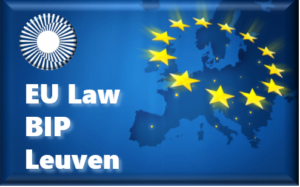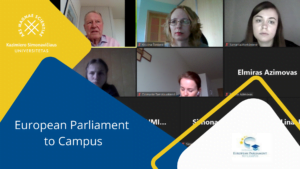The launch of ChatGPT, a generative AI chatbot, in November last year marked the beginning of an AI revolution. Rapidly becoming an essential tool across many professions—such as finance, copywriting, translation, editing, and law—it prompts a reevaluation of the future necessity of various jobs. We spoke with Dr. Jolanta Bieliauskaitė, Rector of Kazimieras Simonavičius University (KSU) and Professor of Law, to explore how AI will reshape the legal profession and what changes legal professionals need to prepare for.
The Impact of AI on the Legal Profession
Dr. Bieliauskaitė explains that, like many other professions, the legal field can greatly benefit from AI, which serves as an excellent assistant in handling preparatory tasks. “Lawyers can already optimize their workflow using AI tools: they can prepare documents, edit texts, translate legal concepts, draft contracts, and write letters more efficiently,” she notes. One standout capability of AI is its proficiency in analyzing vast amounts of documents—a task that many lawyers find time-consuming and are increasingly willing to outsource to AI.
Challenges of Implementing AI in Law
However, the integration of AI in the legal domain is not without its challenges. Dr. Bieliauskaitė highlights several issues, particularly concerning data protection, confidentiality, and decision-making. “These are serious concerns,” she says. “In systems like ChatGPT, data retention and further use are points of contention. Abroad, AI systems are being deployed on corporate servers or in private clouds to mitigate these risks.” Another significant issue is accountability—who is liable for mistakes made by a robot lawyer?
Can AI Replace Lawyers?
Dr. Bieliauskaitė is clear that while AI can assist with many legal tasks, it cannot replace the nuanced decision-making of a human lawyer. “AI can perform many of a lawyer’s tasks, but making a decision requires weighing multiple factors. Only a human, equipped with comprehensive information, knowledge, and intelligence, can creatively solve legal problems that often involve moral and social dimensions,” she asserts. “Mistakes in law are both painful and costly.”
The Future of the Legal Profession
Despite the advancements in AI, Dr. Bieliauskaitė is confident that the legal profession will not disappear. “The need and importance of lawyers will not diminish. AI will help reduce the time spent on routine tasks, but the legal system cannot be regulated by AI alone,” she states. “Lawyers will continue to be indispensable in addressing complex legal issues.”
However, she emphasizes that lawyers must now acquire additional skills such as management, project management, design thinking, process and data analytics, and technological proficiency. “Our university continuously updates its law curriculum to align with global trends and market needs, ensuring that lawyers develop relevant competencies,” she adds.
Preparing for the Changes
To adapt to the technological revolution, Dr. Bieliauskaitė advises that lawyers learn to navigate and leverage AI systems while managing the associated risks. “Universities must review their curricula, assess the future roles of lawyers, and provide opportunities for current professionals to develop new competencies,” she suggests. As an example, she mentions an upcoming event organized by Kazimieras Simonavičius University, titled “Innovations in Law and Technology: Applying Artificial Intelligence in Law and Business,” which will offer practical insights into AI innovations and their applications in legal and business contexts.
Developing Future-Ready Skills
Dr. Bieliauskaitė concludes that to adapt to new realities, continuous learning, creativity, critical thinking, and adaptability are essential. “The role of creative and critical thinking will only grow in importance, and it is our responsibility in education to create environments where these qualities can thrive,” she asserts.
International scientific conference “Challenges to Modern Law: An International Perspective” will be held on May 27-28 by Kazimieras Simonavicius University (KSU).
During the conference 23 participants from 12 countries will explore the impact of globalization on legal systems, including human rights, international trade, and emerging technologies.
Conference will be held at the Kazimieras Simonavicius University (Dariaus ir Gireno str. 21, Vilnius) venue: 203 room (II floor) and online.
Monday 27th: 8:30-16:20
Tuesday 28th: 09:00-15:50
Teams meeting link for online participants:
Join the meeting now
Meeting ID: 397 094 675 870
Passcode: muXDDk
Conference program: Final Programme
More information about the conference: 4th International scientific conference
Conference e-mail: mlconference@ksu.lt
Kipras Stulgys, a third-year student at Kazimieras Simonavičius University (KSU) Law, is seizing the chance to immerse himself in international study at the renowned Autonomous University of Barcelona (Spain) through the Erasmus program. His experience abroad has been nothing short of transformative, as he delves into various facets of law while embracing cultural diversity and forging global connections.
Stulgys is focusing his studies on crimes against humanity, exploring the intersection of technology and law, engaging in guest lectures at European Union institutions, and delving into the fundamentals of gender and equal justice. His academic journey abroad is not just about expanding his knowledge but also about fostering a deeper understanding of legal systems and enhancing his intercultural communication skills.
One of the highlights for Stulgys is the vibrant international community at the Autonomous University of Barcelona. It offers a unique opportunity to interact with people from all corners of the globe. He describes this experience as enriching, emphasizing how it has broadened his perspective on legal traditions and facilitated valuable friendships.
Moreover, Stulgys acknowledges the significance of immersing himself in the Spanish language and culture, which has not only aided in his comprehension of different legal systems but has also enriched his overall cultural experience. He underscores the importance of studying abroad in today’s globalized world, emphasizing how it equips students with invaluable skills and insights that transcend borders.
Encouraging his fellow students to seize similar opportunities, Stulgys emphasizes the transformative potential of studying abroad. He urges them to broaden their horizons, emphasizing the enriching nature of international experiences and the importance of embracing diverse perspectives.
The Erasmus+ Combined Intensive Programme “Strengthening the Legal Understanding of the EU Institutions and their Functioning” concluded on March 8th, and left a lasting impact on all participants. Seven dedicated KSU Law students embarked on this educational journey.
Beginning with remote lectures led by seasoned EU lecturers and the esteemed President of the Court of Justice of the European Union, Koen Lenaerts, the programme provided a robust foundation in EU law. After conquering remote sessions and passing a rigorous test, our KSU students journeyed to Belgium to join fellow participants.
In Belgium, the learning continued with immersive studies in international law, complemented by enriching field trips and informal gatherings. A highlight for many was the simulated European Parliament debate and vote at Leuven City Hall, leaving an indelible mark on their understanding of EU governance.
Reflecting on this transformative experience, Benas Mockus, a KSU Law student, expressed gratitude for the opportunity to deepen his knowledge of European Union law while forging meaningful connections with peers from diverse European backgrounds.
This remarkable programme was made possible through the collaboration of the institutions including the University of Applied Sciences of Leuven, Kazimieras Simonavičius University, Lumsa University, Abertay Dundee University, University of Alba Julia, Leiria Institute, Leiden University of Applied Sciences, IUT Villetaneuse, EPHEC, and Villanueva University.
We invite you to the 4th International Scientific Conference on “Challenges to Modern Law: An International Perspective”, hosted by Kazimieras Simonavicius University in Vilnius.
The conference will be held on May 27–28, 2024, in a hybrid format.
The dynamic and swiftly changing geopolitical landscape necessitates a constant review of legal frameworks, an in-depth examination of conceptual constructs, and an exploration of the feasibility of conceiving novel norms, instruments, and paradigms capable of effectively addressing the multifaceted challenges of our era.
This conference aspires to fulfill its role as a platform for the rigorous analysis of contemporary legal complexities and the assessment of the legal framework’s functionality within national and international communities, ultimately contributing to the advancement of legal scholarship and practice in the evolving legal landscape of our interconnected world.
Participants: Lithuanian and foreign scientists – researchers, lecturers, students, law practitioners, and social partners. The scientific publications of the conference participants will be published in our partners journals.
For more information, visit the conference website: 4th International Scientific Conference, “Challenges to Modern Law: An International Perspective”
Call for Papers
Registration form and paper submission form is here: https://forms.office.com/e/tnV5xL3RSX
 Career in law area is much more than applying national legal basis into practice. Nowadays it’s critical to have a comprehensive understanding about international law, and especially EU policy trends. Lectures, workshops and debates on EU institutions & Enforcement of EU Law will be organised in Erasmus+ Blended Intensive Programme “Enhancing legal understanding of the EU Institutions and their functioning” which is organised by Leuven University of Applied Sciences (Leuven, Belgium) in partnership with Kazimieras Simonavicius Universiry, University of Lumsa (Italy), University of Alba Julia (Romania) and University of Villanueva (Spain). Visit to European Parliament in Brussels and other social / cultural activities are planned as well.
Career in law area is much more than applying national legal basis into practice. Nowadays it’s critical to have a comprehensive understanding about international law, and especially EU policy trends. Lectures, workshops and debates on EU institutions & Enforcement of EU Law will be organised in Erasmus+ Blended Intensive Programme “Enhancing legal understanding of the EU Institutions and their functioning” which is organised by Leuven University of Applied Sciences (Leuven, Belgium) in partnership with Kazimieras Simonavicius Universiry, University of Lumsa (Italy), University of Alba Julia (Romania) and University of Villanueva (Spain). Visit to European Parliament in Brussels and other social / cultural activities are planned as well.
On-site activities will take place on 4-8 March 2024 at Leuven University of Applied Sciences (Belgium). Also, few online meetings in February 2024 will be organised for the preparation for intensive programme in Belgium. Participation in these online meetings is mandatory part of the programme. Students, who successfully pass the whole programme, will be awarded 3 ECTS which will be recognised as part of their study programme at KSU.
Participation in the programme is free of charge. Selected students will receive Erasmus+ scholarship of EUR 553 for the trip and accommodation.
Students of Law (1st-4th year of studies) and EU Law (1st year of studies) are invited to take part in this unique programme. Only 4 places are available for KSU students.
Interested? Submit the Application form till 30 November by e-mail international@ksu.lt.

Congratulations to Masters of European Union Law on successful completion of a double diploma! These are the second graduates at our university, who studied in a double degree studies, implemented together with Taras Shevchenko National University of Kyiv.
We would like to wish all the students career highs and let these diplomas be the leap of their life to an international and perspective career!
Our sincere thanks to the Taras Shevchenko National University of Kyiv for the cooperation in implementing this unique study programme.
More information about the programme and study opportunities is available on our website: https://ksu.lt/en/master-studies/european-union-law-online/.
International scientific conference “Challenges to Modern Law: An International Perspective” will be held on April 24-25 by Kazimieras Simonavicius University (KSU). During the conference 16 participants from 9 countries will critically examine modern legal issues and law as it functions in international community. Conference will be held at the Kazimieras Simonavicius University and online.
Conference program you can find here: Conference programme
Participation is free of charge, but the registration form must be filled in.
Registration form: https://forms.office.com/e/XASA6a0TXi
Certificates will be issued for registered participants after the conference. They will be available to participants who have attended at least one of the conference days.
Zoom meeting link will be sent day before conference.
More information about the conference: Challenges to Modern Law: An International Perspective | KSU
Conference e-mail: mlconference@ksu.lt
 From Monday 27 March until Friday the 31th Businet Moot Court Competition will be organized by the Businet Law Group in cooperation with Kazimieras Simonavicius University.
From Monday 27 March until Friday the 31th Businet Moot Court Competition will be organized by the Businet Law Group in cooperation with Kazimieras Simonavicius University.
A Moot court is an extra curricular activity in which Law students take part in simulated court proceedings, which usually involves drafting briefs (or memorials) and oral argumentation.
12 teams of law students from different countries will take part in this competition. Special guest Irmantas Jarukaitis (Judge at the EU Court of Justice) will talk about the role and the impact of the EU CoJ.
Main competition will be held in Kazimieras Simonavicius University. The semi-finals and the final battle will take place at the Vilnius District Court.
Event date: March 27-31, 2023.
We are happy to announce virtual KSU OPEN DAY, May 5, 2022 at 13:00-15:00 (UTC +3).
It’s a great opportunity to learn about KSU university, Bachelor and Master study programmes, meet International office staff and to know about admission process.
Be now! Questions: admission@ksu.lt
The II International Scientific conference “Problems and Challenges of Contemporary Law in the Context of International Law 2022” will provide an opportunity to critically and creatively address all areas of international law. Applications of innovative methods in solving emerging problems will be presented during the sessions of the event.
The aim of the conference is to promote the public scientific discussion of Lithuanian and world researchers, raising the problems and challenges of modern law in the contexts of international law, commercial, family, criminal and other branches of law.
Participants: Lithuanian and foreign scientists – researchers, lecturers, students, law practitioners, and social partners. The scientific publications of the conference participants will be published in the conference proceedings.
Section topics: International law; Commercial law; Statute law; Criminal law; Family law.
More information: https://lnkd.in/gtba3nRW
RESEARCH COMMITTEE
Prof. dr. Csongor Herke, University of Pecs (Hungary)
Assoc. prof. dr. Mohamed Traore, University of Bamako (Mali) Assoc. prof. dr. Özgür Oğuz, Anadolu University (Turkey)
Phd. Katarzyna Marcinkiewicz-Marszałek, Radom Academy of Economics, Warsaw School of Economics (Poland)
Prof. dr. Antonio Silva, Extremadura University (Spain)
Prof. dr. Manuel de Peralta Carrasco Extremadura University (Spain) Prof. dr. Ángel Acedo Penco Extremadura University (Spain)
Prof. dr. Dalia Perkumienė, Kazimieras Simonavicius University (Lithuania) Doc. dr. Regina Andriukaitienė, Lithuanian Sport University (Lithuania)
Prof. dr. Biruta Švagždienė, Lithuanian Sport University (Lithuania)
Prof. dr. Oscar Paredes, Privada Boliviana University (Bolivia)
Prof. dr. Ingrida Veikša, Turiba University (Latvia)
Assoc. prof. dr. Wenliang Zhang, Renmin University of China (China)
Assoc. prof. dr. Maria João Escudeiro, Polytechnic Institute of Lisbon (Portugal)
Assoc. prof. dr. Rasa Pranskūnienė, Vytautas Magnus University, Lithuania
Prof. dr. Youssef Makloul, Cadi Ayyad University, Morocco
Assoc. prof. Larbi SAFAA, École Supérieure de Technologie d’Essaouira, Université Cadi Ayyad, Morocco.
 Kazimieras Simonavičius University has joined the European Parliament to Campus initiative! On February 25 Hans-Olaf Henkel, a former Member of the European Parliament, gave a lecture to students of the KSU Law study programme on the EU’s role in strengthening human rights, the rule of law and democracy. Students had fruitful discussion with the invited lecturer and KSU professor dr. Dalia Perkumienė. Such event enriched KSU studies with international experience. The topic of the lecture was especially relevant in the current context of events in Ukraine.
Kazimieras Simonavičius University has joined the European Parliament to Campus initiative! On February 25 Hans-Olaf Henkel, a former Member of the European Parliament, gave a lecture to students of the KSU Law study programme on the EU’s role in strengthening human rights, the rule of law and democracy. Students had fruitful discussion with the invited lecturer and KSU professor dr. Dalia Perkumienė. Such event enriched KSU studies with international experience. The topic of the lecture was especially relevant in the current context of events in Ukraine.
The lecturer obtained education at Hamburg University of Economics and Politics. 2014-2019 was a Member of European Parliament: Vice-Chair in the Committee on Industry, Research and Energy, participated in the activities of Committee of Inquiry into Emission Measurements in the Automotive Sector and Subcommittee on Human Rights. Here you may find more information about Mr. Henkel activities in EP.
The lecture was organised in cooperation with The European Parliament Former Members Association (FMA), which brings together more than 800 former MEPs from all EU countries and across the whole political spectrum. Its aim is to inform the citizens of the European Union about EU policies, decisions, institutions and opportunities to participate in legislation and to build a better Europe by involving former MEPs in their work.


 Career in law area is much more than applying national legal basis into practice. Nowadays it’s critical to have a comprehensive understanding about international law, and especially EU policy trends. Lectures, workshops and debates on EU institutions & Enforcement of EU Law will be organised in Erasmus+ Blended Intensive Programme “Enhancing legal understanding of the EU Institutions and their functioning” which is organised by Leuven University of Applied Sciences (Leuven, Belgium) in partnership with Kazimieras Simonavicius Universiry, University of Lumsa (Italy), University of Alba Julia (Romania) and University of Villanueva (Spain). Visit to European Parliament in Brussels and other social / cultural activities are planned as well.
Career in law area is much more than applying national legal basis into practice. Nowadays it’s critical to have a comprehensive understanding about international law, and especially EU policy trends. Lectures, workshops and debates on EU institutions & Enforcement of EU Law will be organised in Erasmus+ Blended Intensive Programme “Enhancing legal understanding of the EU Institutions and their functioning” which is organised by Leuven University of Applied Sciences (Leuven, Belgium) in partnership with Kazimieras Simonavicius Universiry, University of Lumsa (Italy), University of Alba Julia (Romania) and University of Villanueva (Spain). Visit to European Parliament in Brussels and other social / cultural activities are planned as well.

 From Monday 27 March until Friday the 31th Businet Moot Court Competition will be organized by the Businet Law Group in cooperation with Kazimieras Simonavicius University.
From Monday 27 March until Friday the 31th Businet Moot Court Competition will be organized by the Businet Law Group in cooperation with Kazimieras Simonavicius University. Kazimieras Simonavičius University has joined the European Parliament to Campus initiative! On February 25 Hans-Olaf Henkel, a former Member of the European Parliament, gave a lecture to students of the KSU Law study programme on the EU’s role in strengthening human rights, the rule of law and democracy. Students had fruitful discussion with the invited lecturer and KSU professor dr. Dalia Perkumienė. Such event enriched KSU studies with international experience. The topic of the lecture was especially relevant in the current context of events in Ukraine.
Kazimieras Simonavičius University has joined the European Parliament to Campus initiative! On February 25 Hans-Olaf Henkel, a former Member of the European Parliament, gave a lecture to students of the KSU Law study programme on the EU’s role in strengthening human rights, the rule of law and democracy. Students had fruitful discussion with the invited lecturer and KSU professor dr. Dalia Perkumienė. Such event enriched KSU studies with international experience. The topic of the lecture was especially relevant in the current context of events in Ukraine.